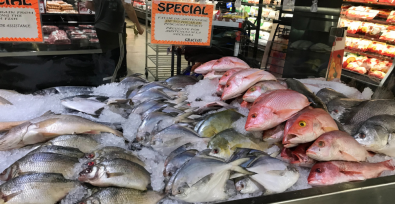A group of Indonesian fishermen recently filed a lawsuit in the US claiming Bumble Bee Foods failed to stop human rights abuses suffered onboard the company’s contracted fishing ships. But now the seafood giant is asking for the case to be dismissed on legal grounds in an effort to end it before it reaches trial, reports Mongabay.
“Americans need to know…”
Believed to be the first of its kind, the forced labor lawsuit is being closely watched. It leverages the Trafficking Victims Protection Act first passed in 2000. Congress has since expanded the important anti-modern slavery legislation. The act now allows survivors to sue individuals or corporations that knowingly benefited from forced labor or related abuses. But the legislation has never been tested in a court of law.
The four survivors stated in an email about the case:
“Americans need to know the cruelty and exploitation that is behind the tuna they buy and eat. There was no break from the violence. I was never paid for my work.”
The four plaintiffs claim they and other crew members faced repeated abuse from the captain and senior crew. Abuse that included beatings with a metal hook and blows to the head amongst many other forms of mistreatment.
“The pain was unimaginable, and I am surprised I survived, by filing this lawsuit, I hope to make things better for other fishers, so no one suffers like I did.”
Bumble Bee, however, claims they had no knowledge of the offences. They have submitted a motion to the court to dismiss the case. The company argues the survivors lack standing for their claims. Further, that they failed to state a proper claim under the law in question and that the court lacks jurisdiction.
Pleading ignorance but something smells fishy
One aspect of the case the fisherman are drawing attention to is that a few years ago Bumble Bee lobbied against a proposed rule that would have addressed forced labor. Thankfully they withdrew the proposed rule. The company has worked hard to secure environmental certifications through the London-based Marine Stewardship Council (MSC). But the eco-label only covers environmental standards, not modern slavery.
Dios Lumban Gaol is coordinator of the maritime department at the Indonesian Migrant Workers Union (SBMI) and is currently providing support to the Indonesian plaintiffs. Dios stressed that not enough pressure has been placed on “market countries.” It’s hoped that this lawsuit will force markets to commit to scrubbing their supply chain of labor exploitation.
Another of the survivors said:
“So many men are out there right now, trapped in the same dangerous situation that I was. They deserve to work free from abuse, to be paid fairly, and to be able to leave their jobs rather than be trapped against their will.”
Tellingly, this isn’t the first time labor rights and environmental groups have raised these types of allegations against Bumble Bee. A report by Greenpeace in 2012 linked Bumble Bee to tuna sourced from vessels accused of using forced labor. Further, the report said the seafood giant consistently failed to take adequate steps to prevent labor abuse in its supply chain.
Using their own “Trace My Catch” tool another report found the company still sourcing fish from a vessel under a “withhold release order.” Yet, allegations and reports were all met with denials or no response at all from Bumble Bee.
No way out, no path to justice
Greenpeace USA is listed as additional counsel in the legal complaint. Sari Heidenrich, a senior human rights adviser at the organization, said the challenge is global seafood supply chains. They are so complex and opaque that workers trapped in forced labor on the boats usually would have no way to find out where their catch ended up. Even worse, they also have no way to seek justice.
This lack of transparency and the huge disconnect between exploited workers and buyers allows the abuse to continue. Big companies are benefiting from slavery at sea. Meanwhile they are keeping consumers in the dark about abuse behind the products they’re buying.
Heidenrich stated:
“I hope that [with] awareness being raised through a lawsuit like this, more workers will know about this pathway, not just in the fishing industry but in general and that we can really start a movement of workers who are able to seek justice,”
Demand true corporate accountability
Freedom United stands with Greenpeace, SBMI and all those advocating for an end to the lack of transparency that allows companies like Bumble Bee to hide slavery at sea on our local grocery shelves.
Only a few cases have ever been brought to court, despite mountains of evidence revealing forced labor. With this lawsuit, there is hope for demanding true corporate accountability, add your voice to power the call.







Freedom United is interested in hearing from our community and welcomes relevant, informed comments, advice, and insights that advance the conversation around our campaigns and advocacy. We value inclusivity and respect within our community. To be approved, your comments should be civil.